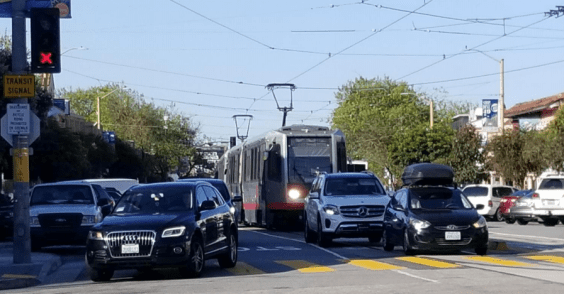In his January budget proposal, Governor Newsom floated the idea of a gas tax "holiday" that would "pause" the scheduled adjustment of the Road Repair and Accountability Act, S.B. 1, in July of this year.
This item wasn't buried in the hundreds of pages of budget documents - he touted it as one of the ways his budget will help "reduce the cost of living" for Californians.
He called it "a $523 million gas tax holiday." That is, the state would give up about $523 million in revenue by instituting a one-year pause on the scheduled adjustment. That's based on an estimated 5.6 percent inflation rate, according to the budget proposal, and Newsom expects to back fill that amount with some of the multi-billion-dollar surplus the state has currently.
It's a politically astute suggestion. Newsom faces re-election this year - although after he beat back last fall's recall and past opponents have shown no appetite for running again, few expect him to lose. People like to hear that they personally will not experience yet one more cost increase, and it's true that there is plenty of money elsewhere in the budget to make up for the "holiday."
It could also be one more way to help the state avoid hitting the Gann limit, which caps the amount of tax money the state can spend, and to which California came very close last year.
But there are other considerations.
The main one is the climate change fight, which was otherwise one of the stars of Newsom's speech. That is, while equity concerns with gas taxes are real, pausing them is inconsistent with climate goals. Gas taxes help encourage people to adopt cleaner transportation and find alternatives to solo driving. Studies on the price of gasoline show this effect increases over time, so a pause would decelerate that effect when we need to speed up the climate fight here.
And Newsom knows that decreasing driving is one of the most powerful ways we have to fight climate change, since transportation emissions, particularly from cars and trucks, make up such a large portion of overall emissions in California.
And look again at why that the inflationary adjustment was put into S.B. 1 to begin with. The gas tax had diminished over time due to a range of issues. For one, it was pegged to a steady per-gallon rate, so even though the price of gas increased dramatically over time, per-gallon revenue stayed the same. Bigger and more powerful cars were causing more damage to existing roads and requiring more money for maintenance, but the tax wasn't keeping pace. In addition, even those bigger vehicles were growing steadily more efficient, using less fuel per distance traveled and per axle weight. And electric cars push this even further.
The point is, legislative leaders knew that gas tax revenue would continue to decline over time because California is aiming to electrify its fleet, and if they didn't build in a regular adjustment to the gas tax, there would be diminishing amounts available for maintaining roads and highways.
And this is just for maintenance, mind you. Definitely not enough for expanding or widening highways, either.
Of course, eventually gas tax revenue will dwindle to nothing anyway, and a different mechanism will be needed to raise funds for road maintenance, but as long as S.B. 1 is in force it will continue to produce transportation revenue.
Then there are the legal questions. It's one thing to propose a "holiday" on S.B. 1 adjustments, but how do you make that happen? It would have to be done via bill somehow, and would absolutely need legislative cooperation, because S.B. 1 doesn't include any discretion for changing this.
That's on purpose. Legislative leaders also knew they couldn't keep having this fight every few years. Getting S.B. 1 passed was a long, hard fight, and some questionable compromises were made along the way.
Would this proposal set a precedent for further mucking with the gas tax in future years? Things could get out of hand - and we could end up with something as convoluted and irresponsible as the gas tax swap [PDF] which thank goodness was rendered moot by S.B. 1.
If a bill changing S.B. 1 were to pass, it would have to address how and when the inflation adjustment would kick back in. Pausing it for one year could set it back permanently if the following year the adjustment doesn't make up for this. Does Newsom mean to propose a permanent tax reduction? Would the legislature agree to that?
All of this will require lots of negotiations, and those didn't really go all that well last year. Who knows, maybe high-speed rail and active transportation funding might get drawn into it, depending who lines up on which side of this.
We'll have to see.





